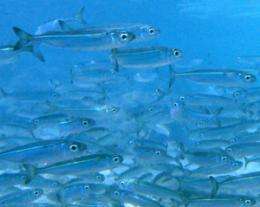Larger groups make better decisions

(PhysOrg.com) -- A study at the University of Sydney shows for the first time that larger social groups make faster, safer and more accurate decisions.
The School of Biological Sciences research is published in the prestigious US journal Proceedings of the National Academy of Sciences this week.
The study presented groups of mosquitofish (Gambusia holbrooki), with a choice to swim down one of two arms in a Y-shaped channel. One arm contained a replica predator, while the other arm did not.
Associate Professor Ward, with PhD student James Herbert-Read and other colleagues, found that larger groups of mosquitofish made the correct decision to swim down the predator-free arm more rapidly than smaller groups and individuals.
"Social animals are frequently required to make collective decisions about such things as the timing and direction of group travel, the detection and avoidance of predators, or the location of food," Associate Professor Ward said.
"We predict that groups of animals are more accurate in their decision-making than individuals.
"In our study, we put animals in a really straightforward decision-making situation, where they could choose one of two options: one of which is 'wrong' and the other 'right'. The wrong decision is to swim down the arm of the Y maze where a predator is concealed; the right decision is to take the alternative path.
"Even though we used a replica predator, the fish couldn't be certain of that - from a distance it looked like a predator. It's better to be cautious and avoid something that might represent a threat, if you are able to detect that threat in the first place."
Using this set-up, the team investigated the two key parameters of decision-making: speed and accuracy.
"An optimal decision must be both fast and accurate. An accurate decision that is slow may be good in some respects, but if a predator is around, it might come too late. Similarly, a rapid but inaccurate decision is clearly far from ideal," Associate Professor Ward said.
James Herbert-Read said the team tested the decision making speed and accuracy of mosquitofish in the Y maze as singles, pairs, or in groups of four, eight or 16.
"What we found is that as group size increases, fish in these groups make both faster and more accurate decisions," he said.
"Their decision-making becomes more and more efficient as the size of their social group increases. Groups of eight and above showed almost 90 percent accuracy, meaning that nine times out of 10 they avoided the predator, whereas single fish managed only about 56 percent accuracy.
"Remarkably, we found that improvements in accuracy start even in groups of two fish and then accelerate rapidly.
"In addition, the fish in the larger groups typically made their decision in less than half the amount of time than that taken by fish on their own."
Why did the mosquitofish do so much better at avoiding predators in groups compared to when by themselves?
"The answer seems to lie in the greater vigilance of animals in groups and their correspondingly greater ability to detect a threat," Associate Professor Ward said.
"In addition to this, once one individual has spotted the threat, the information is transmitted rapidly throughout the group. We don't know exactly how they communicate this - we assume it is to do with their behaviour, which may change once they detect a potential threat."
So while fish on their own may often have simply failed to detect the threat, leading to their overall lack of accuracy, larger groups were extremely good at detecting the threat, acquiring and using the available social information and ultimately avoiding the predator.
"We haven't seen any previous studies that examine how decision making efficiency - that is both speed and accuracy of decision making - changes with group size in any animal, so this finding that fish living in groups benefit from these dramatic improvements is a first," Associate Professor Ward said.
"Given that so many animals of all different kinds live in groups, we speculate that this crucial benefit may have played an important role in the evolution of sociality."
Provided by University of Sydney


















